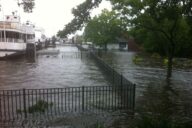Water Quality
What is Water Quality?
Dave Davis | Kent State University
Water quality is a general term that refers to a general description about the properties of a water body. Lakes that have a high water quality possess properties that make it a high valued resource to society and nature.
Commonly, water quality is assessed through the use of many different parameters and methods ranging from simple test kits measuring parameters such as pH to much more complex electronic sensor platforms that can measure a wide variety of parameters over a long time at a high frequency. For each parameter, the quality of the water is generally reported with reference to a specific standard, to allow the quantitative measurement of that factor to be stated as a qualitative statement about the body of water. Often, standards are set by governing organizations, such as the Environmental Protection Agency.
Why is water quality important?
Freshwater resources provide essential services to society. Arguably, the most important of these services is fresh drinking water for municipalities around the world. However, lakes and other freshwater resources also provide other important services, including power generation, water for bathing, sites for recreational activity, and important fisheries. Declining or low water quality impacts the value of lakes – both economically, ecologically, and socially. For example, if pollution enters a lake, it can reduce the water quality enough such that it is unsafe to drink as well as harm organisms that live in the water, reducing the ecological value of the lake. These changes can alter perceived value of the water body and hence reduce recreational activity and nearby land values.
Water quality is also an important concern for both human use of lakes and other freshwaters as well as the ecological value of water bodies. Water quality is used in determining the state of aquatic environments and is an interesting point of study in determining both human impacts and natural processes in the environment.
Water quality can be degraded by a number of important issues. To learn more about how some of the more important issues affect water quality, check out each page. Some of the most important issues in water quality today include:










[…] [4] Source Lake Scientist: http://www.lakescientist.com/learn-about-lakes/water-quality.html […]
[…] [4] Source Lake Scientist […]
[…] leads lakes to become land? In some cases, eutrophication fills them in. In others, water level plays a role. That was the case for an Alaskan lake that […]
[…] still more going on at the Hasler laboratory, including investigations into agricultural runoff, algal blooms and invasive species. And it’s possible to get an update firsthand, thanks to an open house to be […]